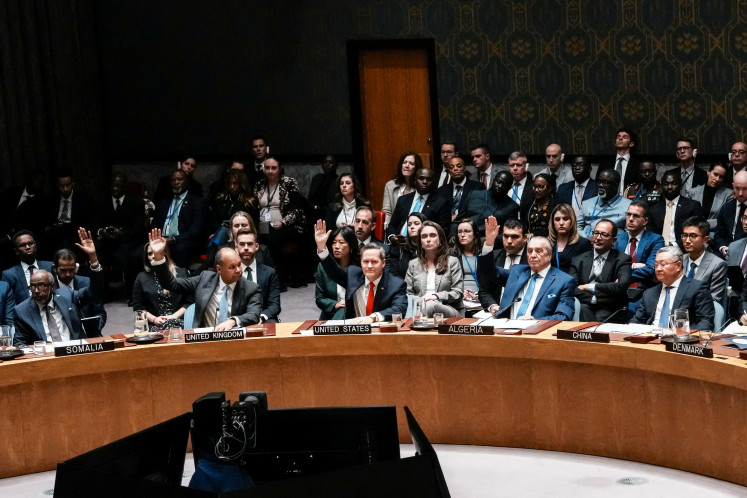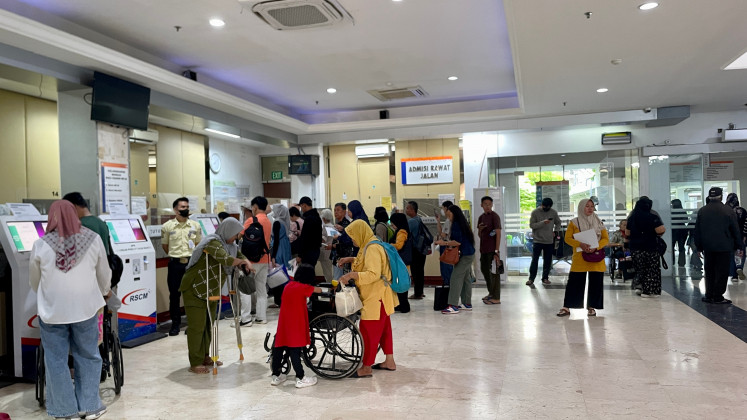Popular Reads
Top Results
Can't find what you're looking for?
View all search resultsPopular Reads
Top Results
Can't find what you're looking for?
View all search resultsLegal uncertainty is caused by advocates
In February 2011 one of the most prominent advocates in Jakarta, a darling of the international community, informed a foreign mission that the main reason for poor legal certainty in Indonesia is the fact that the Supreme Court does not publish its decisions
Change text size
Gift Premium Articles
to Anyone
I
n February 2011 one of the most prominent advocates in Jakarta, a darling of the international community, informed a foreign mission that the main reason for poor legal certainty in Indonesia is the fact that the Supreme Court does not publish its decisions.
This is something one hears quite often from the advocate community. In public statements, the media and publications, the Indonesian advocacy habitually blames the courts for legal uncertainty, and they point at the absence of published court decisions as the main reason.
In reality, in February 2011 the Supreme Court had 22,437 decisions on its website. That is more than the all decisions published by the Supreme Courts of the US, the Netherlands and Australia put together over the past ten years.
Indeed, it is more decisions than the number of decisions published by the US Supreme Court over the past hundred years.
The latest decision that was uploaded was yesterday (www.putusan.mahkamahagung.go.id/).
This large collection does not include the decisions from many other Indonesian courts that are also published.
Thus the Constitutional Court publishes all its decisions on its own website (www.mahkamahkonstitusi.go.id), the Commercial Court published all its decisions since 1998 in hard copy format (by Tatanusa www.tatanusa.co.id), while the decisions published on the individual websites of the respective courts which in many cases are very numerous (cf. Quarterly Fact Sheet Issue 4 — in March 2011 an assessment of all court websites was published cf. Muhamad Faiz Aziz, Mega Ramadhani et al., An assessment of court websites (Jakarta: Tatanusa 2011)). Thus, the religious court Surabaya published 2814 decisions over 2010 (http://www.pa-surabaya.go.id/) and nearly all 340 religious courts publish their decisions separately on their websites.
Furthermore, there are the decisions published over past decades in journals such as Yurisprudensi Indonesia, Varia Peradilan, Hukum dan Pembangunan or Hukum as well as private collections such as Chidir Ali, Setiawan or more recently the MTI series on court decisions in corruption cases.
These collections sometimes are significant: the monthly journal Varia Peradilan published 5-10 decisions in each issue for over 30 years (and continues to do so) and must come close to 3,000 decisions.
The body of court decisions that is publicly accessible has always been understated, but in recent years the Supreme Court in particular has been driving at comprehensive publication, working back in time.
So in sum, modern Indonesia has a very large and very up to date collection of published court decisions.
Why do advocates in this country, including some of the most prominent ones, fail to grasp this reality?
This issue is all the more surprising because the large-scale publication of court decisions is not really something new as we have seen, but has been unfolding since the early days of reform more than a decade ago.
So why would advocates ignore the existence of a very large body of legal information which is readily available at their fingertips?
Why would they even go to the point of stating before foreign visitors that these court decisions do not exist, and that this in fact is the very root cause of legal uncertainty?
One conclusion must be that if advocates do not know about this large collection of court decisions, then presumably their legal practice does not include perusing records of court decisions.
What this comment really says is that the tens of thousands of court decisions that are currently published are irrelevant for the work of advocates in Indonesia.
Under these conditions, for Indonesian advocates to complain about the absence of court decisions breathes hypocrisy.
It also shows that currently one of the main causes of the weak legal certainty in Indonesia sits with the advocate profession.
The way to shape the law and to hold courts accountable for their decisions is through a critical discourse, and it is incumbent on advocates to engage in such discourse when arguing cases before the courts.
When the advocates do not bother to check on published decisions, such critical discourse never happens, and accountability falls flat.
The failure of the Indonesian advocacy to recognize even the existence of a massive body of published court decisions, let alone work with it, is a reflection of the weakness of the advocate profession in Indonesia, marked as it is by professional fragmentation and lack of discipline.
It is important to understand that when we talk about judicial accountability and legal certainty in modern Indonesia, this is less a problem of the law and more a problem of the legal institutions and professions. Also, it is less a problem of courts, and more a problem of the advocacy.
Of course, the Supreme Court shares responsibility in enforcing its own discipline.
It really does not help if one senior Supreme Court Justice says that consistent jurisprudence implies that some jurisprudence therefore can be inconsistent as happened not too long ago. As legal systems go this is just wrong, and not a very intelligent statement.
Another Supreme Court Justice said just last month that “we have the continental legal system which therefore means we have disparity in decisions”. This statement shows complete ignorance about even the roots of the Indonesian legal system, or what legal systems are about generally.
It is just an utterly foolish thing to say. Comments such as these are troubling, and do their bit in reducing public confidence in the competence of the Supreme Court and the legal system in Indonesia as a whole.
The Supreme Court leadership must be much firmer and clearer in defining what its decisions actually mean. The court absolutely must create discipline in its own decision-making, actively project that discipline to the broader legal community and beyond, and be tough in maintaining that discipline internally.
This is much more than just instituting chambers: It is instilling a common understanding on the role and true meaning of court decisions.
But in the broader context of making courts accountable and shaping the law, the Supreme Court more than holds its part of the bargain.
Its publication of decisions is really impressive, indeed unprecedented. More generally the information the courts made available to the general public exceeds that of all other state institutions, ranging from court decisions to budget figures.
The judiciary is the most transparent public agency in the country.
Making that information and accountability work really is up to the legal professions, the advocates foremost amongst them.
They ought to analyze and digest the court decisions, use them in their own litigation, refer to them, develop a disciplined critical discourse between each other and the courts. The advocates fail to do all this: they do not read, do not use, do not refer and do not discourse.
And when foreign visitors come, the advocates even deny the decisions are there.
It is a shame. And it underscores that the principal cause for the lack of legal certainty in modern Indonesia is with the fragmented and incompetent Indonesian advocacy.
The writer is program manager, National Legal Reform Program.










